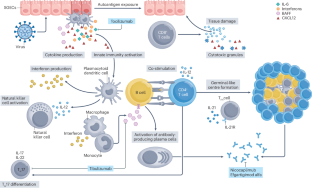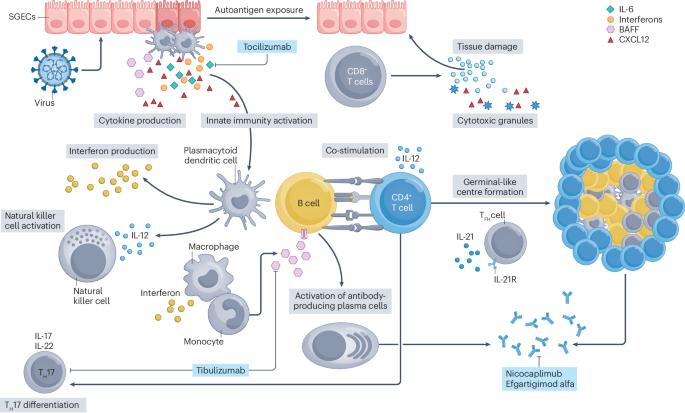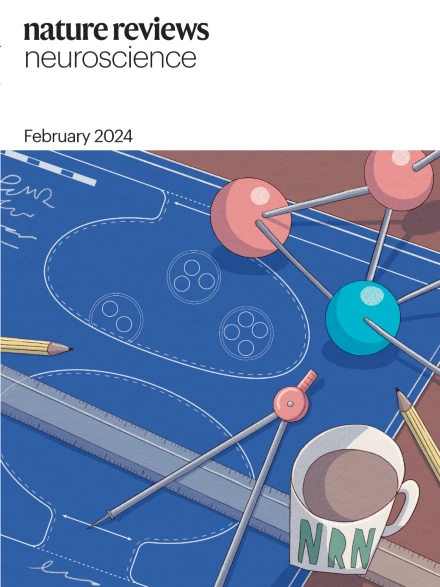Update on the pathophysiology and treatment of primary Sjögren syndrome
IF 29.4
1区 医学
Q1 RHEUMATOLOGY
引用次数: 0
Abstract
Sjögren syndrome or Sjögren disease is a chronic form of autoimmune epithelitis characterized by lymphocytic infiltration of the exocrine glands, particularly the salivary and lacrimal glands, leading to progressive glandular dysfunction and subsequent xerostomia and xerophthalmia. Other common manifestations include pain and fatigue, various systemic manifestations and non-Hodgkin’s lymphoma. Sjögren syndrome is therefore a complex and disabling disease associated with a reduced quality of life and with considerable long-term damage. Most of the available treatments are merely symptomatic with limited efficacy in both preventing glandular damage and suppressing systemic disease activity. In the past 10 years, great progress has been made in understanding the pathophysiology of Sjögren syndrome, opening new avenues towards a more targeted and individualized therapeutic approach to the disease. Indeed, several randomized controlled trials have just been completed or are poised to commence evaluating the effectiveness of novel drugs targeting both innate and adaptive immune pathways, including pro-inflammatory cytokines, the type I interferon system, B cell activation, B cell and T cell co-stimulation pathway, and ectopic germinal centre formation. Novel clinical trials are also ongoing exploring various targeted approaches (that is, IgG recycling inhibition, nuclease therapy and CAR-T cell therapy) for Sjögren syndrome. Sjögren syndrome is a chronic autoimmune disease affecting exocrine glands, causing dryness and systemic symptoms. Treatment has been primarily symptomatic, but advances in our understanding of its pathophysiology offer promise for targeted therapies, aiming for personalized care and improved outcomes.


原发性斯约格伦综合征的最新病理生理学和治疗方法。
斯约格伦综合征或斯约格伦病是一种慢性自身免疫性外分泌腺炎,其特征是淋巴细胞浸润外分泌腺,尤其是唾液腺和泪腺,导致进行性腺体功能障碍,继而出现口干症和眼干症。其他常见表现还包括疼痛和疲劳、各种全身性表现和非霍奇金淋巴瘤。因此,斯约金综合征是一种复杂的致残性疾病,会降低患者的生活质量,并造成严重的长期损害。现有的治疗方法大多只是对症治疗,在预防腺体损伤和抑制全身疾病活动方面的疗效有限。在过去的 10 年中,人们在了解斯约格伦综合征的病理生理学方面取得了巨大进步,为采用更具针对性和个性化的治疗方法开辟了新的途径。事实上,一些随机对照试验刚刚完成或即将开始,评估针对先天性和适应性免疫途径(包括促炎细胞因子、I 型干扰素系统、B 细胞活化、B 细胞和 T 细胞协同刺激途径以及异位生殖中心的形成)的新型药物的有效性。目前还在进行新的临床试验,探索治疗斯约恩综合征的各种靶向方法(即 IgG 循环抑制、核酸酶疗法和 CAR-T 细胞疗法)。
本文章由计算机程序翻译,如有差异,请以英文原文为准。
求助全文
约1分钟内获得全文
求助全文
来源期刊

Nature Reviews Rheumatology
医学-风湿病学
CiteScore
29.90
自引率
0.90%
发文量
137
审稿时长
6-12 weeks
期刊介绍:
Nature Reviews Rheumatology is part of the Nature Reviews portfolio of journals. The journal scope covers the entire spectrum of rheumatology research. We ensure that our articles are accessible to the widest possible audience.
 求助内容:
求助内容: 应助结果提醒方式:
应助结果提醒方式:


